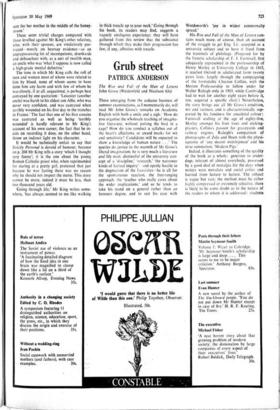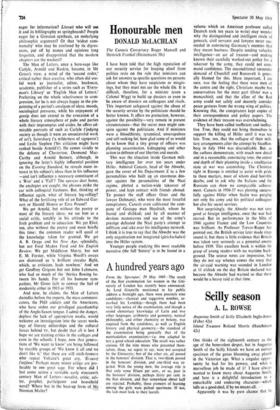The Rise and Fall of the Man of Letters John
Gross (Weidenfeld and Nicolson 63s)
Grub street
PATRICK ANDERSON
The Rise and Fall of the Man of Letters John Gross (Weidenfeld and Nicolson 63s) Those emerging from the arduous business of summer examinations, as I momentarily do, will read Mr John Gross's remarks on Academic English with both a smile and a sigh : 'How do you organise the wholesale teaching of imagina- tive literature, without putting the bird in a cage? How do you conduct a syllabus out of the heart's affections, or award marks for wit and sensitivity? Candidates will be expected to show a knowledge of human nature . . .' The queries do justice to the warmth of Mr Gross's liberal imagination; he is very much a literature and life man; distrustful of the university con- cept of a 'discipline,' research,"the narrower kinds of fai:tual inquiry'—and openly hostile to the dogmatism of the Leavisites—he is all for the spontaneous reaction, the free-ranging approach, the 'teacher who really cares about the wider implications,' and so he tends to take his stand on a general rather than an honours degree, and to rest his case with Wordsworth's 'joy in widest commonalty spread.'
His Rise and Fall of the Man of Letters con- tains much more, of course, than an account of the struggle to get Eng. Lit. accepted as a university subject and to have it freed from the trammels of philology. (Prepared for by the frenetic scholarship of F. J. Furnivall, first adequately represented in the professorship of Henry Morley at University College in 1865, it reached Oxford in adulterated form twenty years later, largely through the campaigning of the formidable Churton Collins, with the Merton Professorship to follow under Sir Walter Raleigh only in 1903, while Cambridge had to wait for another eight years before it, too, acquired a specific chair.) Nevertheless, the story brings out all Mr Gross's erudition, wit and raciness, and is characteristically sup- ported by his fondness for anecdotal colour: Furnivall sculling at the age of eighty-five, Morley amongst his fruit trees and sticking- plasters, Collins's passion for graveyards and railway engines, Raleigh's comparison of photographs of Zola and Ibsen with the physi- ognomy of 'any decent midshipman' and his terse summation, 'Modern Pigs.'
Indeed, it illustrates something of the quality of the book as a whole: generous to under- dogs, tolerant of almost everybody, possessed by a good deal of nostalgia for the days when writers were moralists and social critics and hurried from lecture to lecture. The subject is vague but vast; the method must be either highly compressed or extremely selective; there is likely to be some doubt as to the nature of the readers to whom it is addressed : students
eager for information? Literati who will we it and its bibliography as springboards? People eager for a Grossian synthesis, an underlying philosophic argument? Or that 'widest com- monalty' who may be confused by its digres- sions, put off by names and opinions long forgotten, and disappointed that the modern chapters are the weakest?
The Man of Letters, once a hero-sage like Carlyle, Arnold and Ruskin, became, in Mr Gross's view, a mind of the 'second order,' critical rather than creative, who often did use- ful work as journalist, editor, bookman, academic, publisher of a series such as 'Every- man's Library' or 'English Men of Letters: Preferring on the whole selectiveness to com- pression, for he is not always happy in the pin- pointing of a period's amalgam of ideas, moods, sociological pressures, while his enjoyment of gossip does not extend to the evocation of a whole literary atmosphere of pubs and parties with their impromptus and asides, he offers ad- mirable portraits of such as Carlyle (judging society as though it were an unsuccessful work of are), Saintsbury ea wilderness of signposts') and Leslie Stephen (Ws criticism might have ranked beside Arnold's'). He comes vividly to the defence of Chesterton, Desmond Mac- Carthy and Arnold Bennett, although, in ignoring the latter's highly influential position on the Evening Standard, he reveals more in- terest in his subject's ideas than in his influence —and isn't influence a necessary constituent of a 'Rise' and a 'Fall'? The apercus dart home, the analogies are caught, the phrases strike the ear with colloquial freshness. But, thinking of influence again, what of literary log-rolling? What of the fertilising role of an Edward Gar- nett or Harold Monro or Ezra Pound?
We get Arnold, but without the poetry or most of the literary ideas; we see him as a social critic, notably in his attitude to the Irish problem and to education. We get Eliot, too, also without the poetry and more briefly this time: the common reader will quail at the knowledge taken for granted. We get A. R. Orage and his New Age, splendidly, but not Ford Madox Ford and his English Review. We get Middleton Murry, but not E. M. Forster, while Virginia _Woolf's essays are dismissed as 'a brilliant circular flight, which, as criticism, leads nowhere.' And We get Geoffrey Grigson but not John Lehmann, who had so much of the 'thirties flowing be- tween his hands. For all his humane sym- pathies, Mr Gross fails to convey the feel of modernity either in 1913 or 1933.
And now, he claims, the Man of Letters dwindles before the experts, the mass communi- cators, the PhD addicts and the Americans, who have stolen our privileged guardianship of the Anglo-Saxon tongue. I admit the danger, deplore the lack of appropriate media, would welcome an investigation into the secret work% ings of'-literary editorships and the cultural forces behind TV, but doubt that all is lost. I hope we are training critics in the colleges and even in the schools. I hope, now that genera- tions of 'We want to know' are being followed by sizeable groups of 'We know it all and we don't like it,' that there are still sixth-formers who repeat Voltaire's great cry, Rcraser l'infdme: Perhaps many minor critics are-pre- ferable to one great sage. For where dia I last come across a veritable early nineteenth century Man of Letters—novelist, critic, edi- tor, prophet, participator and household word? Where but in the beat-up form of Mr Norman Mailer?



































 Previous page
Previous page